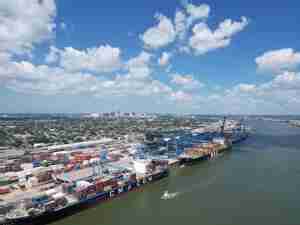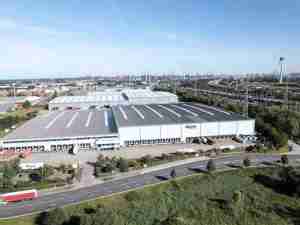US West Coast port backups delay apparel, bobbleheads, french fries
By: Reuters | Dec 12 2014 at 04:58 PM | Ports & Terminals
Crippling cargo backups at U.S. West Coast ports stretched into a third month amid industry reports of prolonged shipment delays for goods ranging from yoga apparel and rice to NBA bobblehead collectibles and frozen french fries.
The congestion crisis has been most pronounced at the twin ports of Los Angeles and Long Beach, the nation’s two busiest cargo hubs, where marine officials reported 11 ships anchored on Thursday waiting for berths to open.
The number of freighters kept waiting outside the two ports has fluctuated from about eight to 18 on any given day since the slowdown began there around mid-October, said Phillip Sanfield, spokesman for the port of Los Angeles.
Smaller backups have hit other West Coast ports, including Oakland, California, and the ports of Seattle and Tacoma in Washington state.
The slowdowns have coincided with prolonged labor talks between 20,000 dockworkers and the Pacific Maritime Association, representing terminal operators and shipping lines at 29 West Coast ports. Their latest contract expired June 30.
Management has accused the International Longshore and Warehouse Union of orchestrating some work slowdowns on the docks to increase its leverage at the bargaining table.
Union officials deny organizing protest delays but acknowledge that individual dockworkers may have acted out of frustration over the pace of contract talks.
They point to other factors that port officials cite as the main reasons for gridlock. Chief among them has been a shortage of tractor-trailer chassis used for hauling cargo containers from the ports, a situation created when shippers decided to sell off their chassis to equipment-leasing companies.
Union and port officials also cite record import levels at the peak cargo season, rail service delays and the advent of super-sized container vessels delivering greater cargo volumes.
Bobbleheads, Yoga Wear & Rice
Port slowdowns have rippled through the commercial supply chain.
Vancouver-based retailer Lululemon Athletica Inc blamed West Coast port congestion, particularly in Los Angeles and Seattle, for its lower sales forecasts on Thursday. The yoga wear seller said about 1 million of its garments were stuck in port, delaying shipments to stores for up to 10 days.
Similar shipment delays were reported by Ann Inc and Ascena Retail Group Inc, parent companies of women’s apparel chains Ann Taylor and the Loft, and Lane Bryant and Justice, respectively.
Even professional sports franchises have felt the pinch. The Oakland-based Golden State Warriors earlier this month had to hand out vouchers to 10,000 basketball fans after shipments of the team’s Sarunas Marciulionis bobblehead figures were delayed for several weeks.
Exports have been squeezed as well. Fast-food giant McDonald’s Corp said its Japan outlets are among that country’s eateries grappling with a shortage of french fried potatoes blamed on U.S. West Coast port delays.
Most U.S.-processed frozen potato products bound for Japan and other Asian countries are shipped in refrigerated containers through Seattle-Tacoma and Portland, Oregon, said John Toaspern, chief marketing officer for the U.S. Potato Board.
Japan is the biggest Asian market for U.S.-made french fries, importing $336 million in frozen potato products last year.
Toaspern said the port backups have at least doubled transit times for french fry shipments to Japan from two to four weeks.
Container shipments of California-grown rice bound for Japan, South Korea and Taiwan have likewise been delayed two week or more at the port of Oakland at the height of growers’ winter shipping season.
“You start running short on warehouse space. It’s a mess,” said Tim Johnson, president and chief executive of the California Rice Commission.
Delays also were taking a toll on container shipments of corn and soybeans, forcing the Illinois-based Prairie Creek Grain Company to offer some customers in Southeast Asia discounts of up to 6 percent.
A roughly $700 discount per $12,000 container of soybeans is the difference between making a profit and breaking even, said Robert Briscoe, Prairie Creek president.
He said his company is now turning away business to avoid paying late fees and fears losing some of its hard-won customers to larger bulk shippers. “We’ve slowed up our sales considerably, probably by 50 percent,” he said. “We can’t keep taking late-ship discounts and we don’t see any end in sight.” (Reuters)









